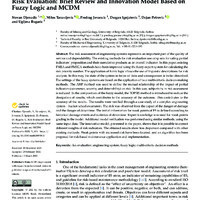Risk Evaluation: Brief Review and Innovation Model Based on Fuzzy Logic and MCDM
Објеката
- Тип
- Рад у часопису
- Верзија рада
- објављена верзија
- Језик
- енглески
- Креатор
- Stevan Djenadic, Milos Tanasijevic, Predrag Jovancic, Dragan Ignjatovic, Dejan Petrovic, Ugljesa Bugaric
- Извор
- Mathematics
- Издавач
- MDPI AG
- Датум издавања
- 2022
- Сажетак
- The risk assessment of engineering systems represents an important part of the quality of service and dependability. The existing methods for risk evaluation use crisp sets for rating partial indicators’ proposition and their cumulative products as an overall indicator. In this paper, existing FMEA and FMECA methods have been improved using the fuzzy expert system for calculating the risk priority number. The application of fuzzy logic allows the use of linguistic descriptions for risk analysis. In this way, the state of the system in terms of risks and consequences is better described. The settings of the fuzzy systems are based on the application of two multi-criteria decision-making methods. The AHP method was used to define the mutual relationship of the impact of partial indicators (occurrence, severity, and detectability) on risk. In this way, subjectivity in risk assessment is reduced. In the composition of the fuzzy model, the TOPSIS method is introduced to reduce the dissipation of results, which contributes to the accuracy of the outcome. This contributes to the accuracy of the results. The results were verified through a case study of a complex engineering system—bucket-wheel excavators. The risk was observed from the aspect of the danger of damage and the danger of downtime. The initial information for weak points of ES is defined according to historical damage events and statistics of downtime. Expert knowledge was used for weak points grading in the model. Additional model verification was performed using similar methods, using the same input data. The innovative model, presented in the paper, shows that it is possible to correct different weights of risk indicators. The obtained results show less dispersion compared with other existing methods. Weak points with increased risk have been located, and an algorithm has been proposed for risk-based maintenance application and implementation.
- том
- 10
- Број
- 5
- број страница
- 26
- doi
- 10.3390/math10050811
- issn
- 2227-7390
- Subject
- rizik, inženjerski sistemi, fazi logika, višekriterijumske metode
- risk evaluation, engineering system, fuzzy logic, multi-criteria decision methids
- Шира категорија рада
- M20
- Ужа категорија рада
- М21а
- Права
- Отворени приступ
- Лиценца
- Creative Commons – Attribution-NonComercial 4.0 International
- Формат
- Скупови објеката
- Драган Игњатовић
- Предраг Јованчић
- Милош Танасијевић
- Стеван Ђенадић
- Radovi istraživača
- Медија
 mathematics-10-00811-v3.pdf
mathematics-10-00811-v3.pdf
Stevan Djenadic, Milos Tanasijevic, Predrag Jovancic, Dragan Ignjatovic, Dejan Petrovic, Ugljesa Bugaric. "Risk Evaluation: Brief Review and Innovation Model Based on Fuzzy Logic and MCDM" in Mathematics, MDPI AG (2022). https://doi.org/10.3390/math10050811
This item was submitted on 9. новембар 2022. by [anonymous user] using the form “Рад у часопису” on the site “Радови”: http://dr.rgf.bg.ac.rs/s/repo
Click here to view the collected data.